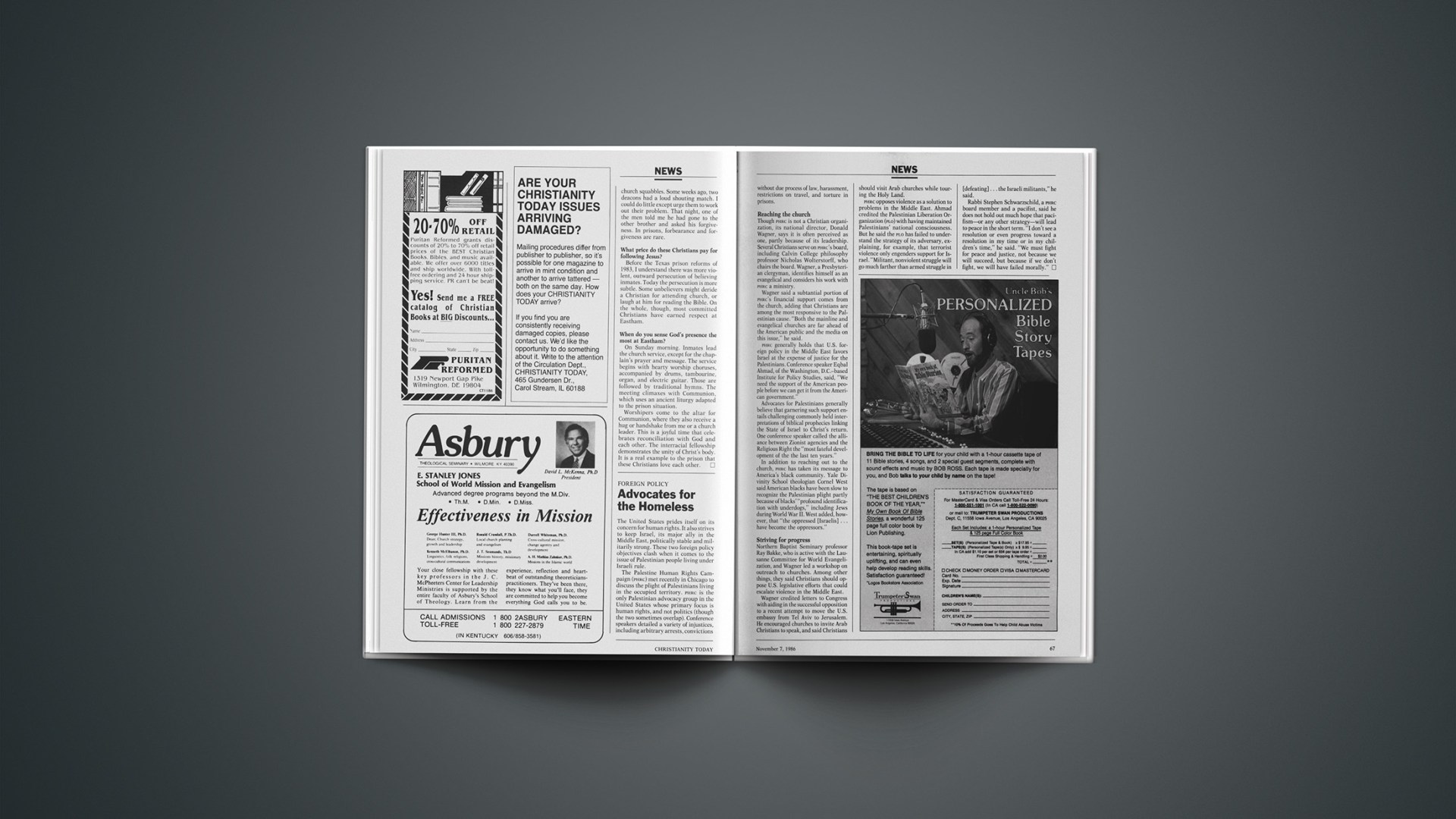The United States prides itself on its concern for human rights. It also strives to keep Israel, its major ally in the Middle East, politically stable and militarily strong. These two foreign policy objectives clash when it comes to the issue of Palestinian people living under Israeli rule.
The Palestine Human Rights Campaign (PHRC) met recently in Chicago to discuss the plight of Palestinians living in the occupied territory. PHRC is the only Palestinian advocacy group in the United States whose primary focus is human rights, and not politics (though the two sometimes overlap). Conference speakers detailed a variety of injustices, including arbitrary arrests, convictions without due process of law, harassment, restrictions on travel, and torture in prisons.
Reaching The Church
Though PHRC is not a Christian organization, its national director, Donald Wagner, says it is often perceived as one, partly because of its leadership. Several Christians serve on PHRC’s board, including Calvin College philosophy professor Nicholas Wolterstorff, who chairs the board. Wagner, a Presbyterian clergyman, identifies himself as an evangelical and considers his work with PHRC a ministry.
Wagner said a subtantial portion of PHRC’s financial support comes from the church, adding that Christians are among the most responsive to the Palestinian cause. “Both the mainline and evangelical churches are far ahead of the American public and the media on this issue,” he said.
PHRC generally holds that U.S. foreign policy in the Middle East favors Israel at the expense of justice for the Palestinians. Conference speaker Eqbal Ahmad, of the Washington, D.C.—based Institute for Policy Studies, said, “We need the support of the American people before we can get it from the American government.”
Advocates for Palestinians generally believe that garnering such support entails challenging commonly held interpretations of biblical prophecies linking the State of Israel to Christ’s return. One conference speaker called the alliance between Zionist agencies and the Religious Right the “most fateful development of the the last ten years.”
In addition to reaching out to the church, PHRC has taken its message to America’s black community. Yale Divinity School theologian Cornel West said American blacks have been slow to recognize the Palestinian plight partly because of blacks’ “profound identification with underdogs,” including Jews during World War II. West added, however, that “the oppressed [Israelis] … have become the oppressors.”
Striving For Progress
Northern Baptist Seminary professor Ray Bakke, who is active with the Lausanne Committee for World Evangelization, and Wagner led a workshop on outreach to churches. Among other things, they said Christians should oppose U.S. legislative efforts that could escalate violence in the Middle East.
Wagner credited letters to Congress with aiding in the successful opposition to a recent attempt to move the U.S. embassy from Tel Aviv to Jerusalem. He encouraged churches to invite Arab Christians to speak, and said Christians should visit Arab churches while touring the Holy Land.
PHRC opposes violence as a solution to problems in the Middle East. Ahmad credited the Palestinian Liberation Organization (PLO) with having maintained Palestinians’ national consciousness. But he said the PLO has failed to understand the strategy of its adversary, explaining, for example, that terrorist violence only engenders support for Israel. “Militant, nonviolent struggle will go much farther than armed struggle in [defeating] … the Israeli militants,” he said.
Rabbi Stephen Schwarzschild, a PHRC board member and a pacifist, said he does not hold out much hope that pacifism—or any other strategy—will lead to peace in the short term. “I don’t see a resolution or even progress toward a resolution in my time or in my children’s time,” he said. “We must fight for peace and justice, not because we will succeed, but because if we don’t fight, we will have failed morally.”










